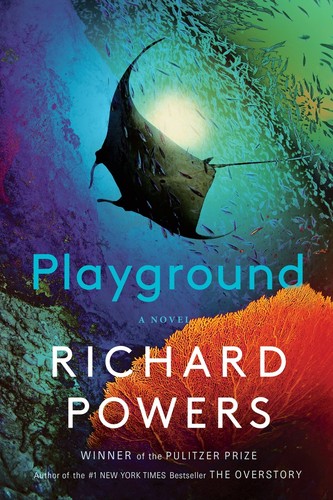sol2070 reviewed Playground by Richard Powers
Fiction to broaden the world view
5 stars
(texto integral com links, em português → sol2070.in/2024/09/livro-playground-richard-powers/ )
"Playground" (2024, 400 pgs.) by Richard Powers was one of the books I was most looking forward to. After all, "The Overstory" was probably the best fiction I've ever read -- I wrote about this last year and it still holds up.
It didn't disappoint. It's magnificent speculative fiction (bordering on science fiction), now forming the author's ecological trilogy, with "The Overstory" (2018) and "Bewilderment" (2021). Instead of the word ‘ecological’, he prefers the term ‘trilogy about belonging to the world’, in the sense that it goes against the dominant narrative that humans, because of a supposed superiority, are practically beyond nature and can then do whatever they want with it. This is at the root of the current environmental emergency. In these books, nature is not something separate, a backdrop or a source of resources. It is the protagonist. Nature doesn't belong to us; on the contrary, we belong to her.
As one reviewer put it, what "The Overstory" does with trees -- many people felt transformed and began to actually recognize nature -- "Playground" does with the ocean. But it's a book with a smaller focus and a less expansive narrative arc, which interconnects four characters (there were nine in the first book).
The plot revolves around the (real) island of Makatea, in Micronesia, a region of archipelagos between the Philippines and Hawaii. Trying to recover from the mining that devastated it last century, and faced with rising sea levels, its small community receives a proposal for re-industrialisation, to build a floating city for a group of techno-billionaires who want to escape regulations and taxes.
Another central theme is information technology and the life of a techno-billionaire. We follow the character Todd Keane from his teenage years in the 1970s to his transformation into an omnipotent Muskian tech-bro. I felt a little divided by the sympathy this billionaire arouses, but on second thoughts, perhaps a humanised portrait of megalomania is worth more than a simplistic condemnation.
As Powers was a programmer before turning to fiction, computers are a constant in his stories. In addition to the biosphere, a parallel and central theme is artificial intelligence. There's no way of commenting too much without spoiling, but I can say that it was one of the best portrayals of this I've seen in fiction, including a bewildering twist.
It's also a book about an intense and touching friendship (practically a ‘bromance’), that of this billionaire with another displaced genius, only more traumatised, a black boy with whom he became inseparable at school.
Although the author wanted to make nature touch the heart in the same way as human drama, I personally felt that people were more moving in this book. Another difference is that the ecological message is less incisive. It's there all the time, but it leaves the initiative to be indignant more to the reader. Perfect dosage.
I compare it so much to the first book because it made such an impression on me. But "Playground" is totally independent, and may even work better for certain audiences, such as young people, due to its more sci-fi feel, and its open-ended conclusion, without a very definite ‘moral of the story’.
Its optimistic tone is also a relief from the apocalyptic tones prevalent in ecological fiction. In interviews, he explained the logic of this optimism, which is far from the naïve Pollyannaism of imagining that everything will end well: humans are not the main characters, life on Earth is the protagonist; this natural process has always coped well, with infinite creativity, even in the face of the greatest planetary catastrophes. In other words, whatever happens to us humans, the greater life will take care of itself, as she always has.



